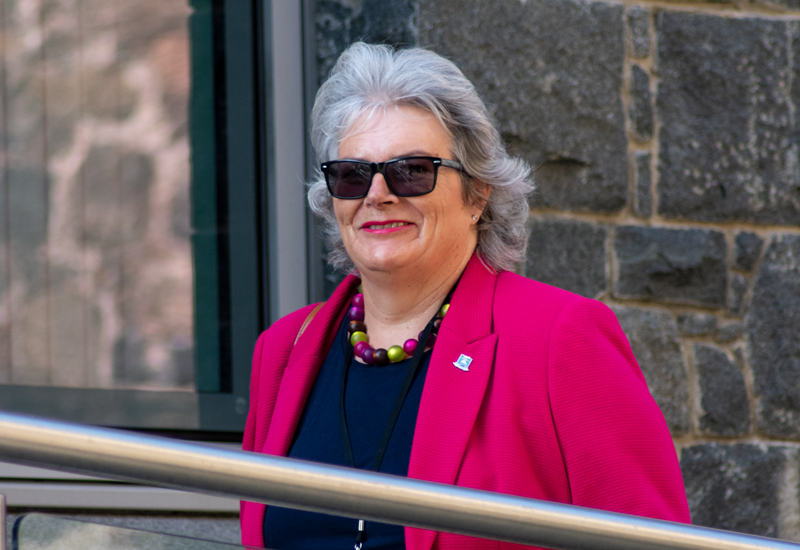


Did the internal review of the biggest public health crisis in a century go far enough? Express reached out to local politicians to find out.
Express emailed all 38 deputies and the two Alderney Representatives and received only three replies.
The arguments in favour of that at the time centered on fiscal prudence, stopping pointless naval-gazing, and the general feeling that the islands had got the big calls right.
The resulting review was full of praise for those working behind the scenes and the new systems which had to be quickly developed, with modest recommendations to review if the Civil Contingencies Authority, established in 2012, should be modified to deal with a multi-year emergency where sweeping and at time draconian government powers are required.

Pictured: Deputy Aldwell became a States member while the Bailiwick was free of the first lockdown and operating in a bubble.
Deputy Sue Aldwell, who was first elected the States in October 2020 in-between the two lockdowns, and sits on the Home and Education Committees, said she was “satisfied” with the “comprehensive” review which explained the measures taken and “inevitably what lessons can be learnt”.
“Hindsight is a wonderful thing.”
She voted for the internal review to avoid spending “possibly up to £400,000 for an external report”.
“I am grateful for having Dr Brink to advise the government and all the deputies who took responsibility on the CCA, along with all the civil servants and staff in every sector of the States who carried out the tasks to keep our islanders safe and secure, along with the third sector. They all acted selflessly.”

Pictured: Deputy Prow has had a direct political role in handling pandemic since 2020, and later served on the Civil Contingencies Authority.
Deputy Rob Prow is the President of Home Affairs and therefore also a current member of the CCA. He took the job following the 2020 election, but was also a States member in the previous political term, where he sat on Health & Social Care for the initial pandemic response.
He echoed much of what his Home Committee colleague said but emphasised that the recommendations and lessons shouldn’t be left “on a shelf”.
“It is in my view sufficient. It is actually quite extensive over 100 pages with much data and compares evidence with the jurisdictions making up the British isles (including the devolved Scottish Assembly) and the Crown Dependencies.
“I would note that much of the review dealt with analysing the evidence upon which the Bailiwick’s response was conducted. The review needs to be put in that perspective. Yes of course we must learn and there are some aspects that government would do differently and the conclusions must be further analysed and where necessary action taken."
It was a good example of the islands’ capability to respond to a serious and immediate emergency, he added.
“The acid test is that the response generally had overwhelming public support. The report shows without doubt, for me, that we currently have quality and dedicated professionals in Public Health, the Hospital and healthcare, the Police and Border Agency, those involved with education, and across our public sector. The team work from my perspective was exceptional and often innovative - from the front line to those making challenging decisions based upon the excellent advice and research provided.”
He said he has “no reason” not to trust the internal audits being carried out over elements of major public spending, such as business support payments.

Pictured: Deputy St Pier was heavily involved in the pandemic response throughout most of 2020.
Deputy Gavin St Pier, who led the Bailiwick through the first lockdown as Policy & Resources President Chairman of the CCA, said while the review “satisfies itself that the right decisions were taken at the right time” there was a lack of challenge on the big decisions.
“Did we lockdown too early or too late? Were we too slow to unlock? These are the decisions which had the biggest impact, not only on our public finances in supporting business through the lockdowns but also on the mental health and well-being of the community and our education system,” he said.
Deputy St Pier added that comparisons should have been drawn on different approaches by other jurisdictions, such as Sweden, to gauge the different “societal impacts” to help plan for the next public health crisis. That is not achieved by focusing on covid-related deaths and infection rates per capita, he said.

Pictured: The States' review suggested the CCA was not set up to deal with an extended period of emergency.
The first recommendation of the States’ review called for investigations into a possible alternative to the CCA, partly due to the nature of the covid emergency, but also since the sweeping powers it has within related situations does not "sit easily" with the consensus basis of Guernsey's parliament.
Deputy St Pier said some tweaks to the emergency laws “to better accommodate a rolling emergency such as the pandemic would seem sensible”.
But he argued that the success of the response came from the communities’ trust in the Authority’s directives rather than the “structure or powers of the CCA”.
“That comes down to people and behaviours not the law. And that also is why we shouldn't have been afraid to be more challenging with this review. It would have helped build confidence for the next emergency,” he said.
Deputy Prow said he is unable to see how the Bailiwick could’ve coped with the pandemic without the emergency powers and framework of the CCA.
“It can only act in an emergency, and regulations must be ratified by the States in very short order. There was good scrutiny and debate and Rule 11 questions throughout. If anything, for me, it endorses the need for the CCA and the law. The report endorses that covid was indeed such an emergency."
He said, while it is “absolutely right that government studies the report and seeks to improve legislation” there is “no need to rush to fix things unless they are clearly broken”.
“The bottom line is that the Bailiwick response was effective. Whether it be the on island testing and sequencing, the role of the border restrictions and self-isolation, the approach to contact tracing and the vaccine roll out. These things clearly saved lives.
“The more immediate issues are from the damage done to our economy, bringing down waiting lists and supporting education and making sure we complete our recovery from the pandemic. This is where we should place our energies.”
States reject independent review of covid response
P&R to return to the States in April with details of covid review
Comments
Comments on this story express the views of the commentator only, not Bailiwick Publishing. We are unable to guarantee the accuracy of any of those comments.